7 Ways Does Naltrexone Help with Anxiety Relief
Overview
Naltrexone may assist in relieving anxiety by modulating endorphin levels and stabilizing brain chemistry, which can lead to improved mood and reduced stress symptoms. This article explores research and real-life testimonials that indicate low-dose naltrexone (LDN) has shown potential in alleviating anxiety, particularly among individuals with concurrent conditions such as PTSD and depression. However, it is important to note that its use for anxiety is still under investigation and has not yet received FDA approval.
Furthermore, the benefits of LDN in managing anxiety symptoms are noteworthy. By considering the experiences of those who have utilized this treatment, we can better understand its implications. If you or someone you know is struggling with anxiety, exploring LDN as a potential option could be worthwhile.
As a result, while more research is needed to fully endorse its effectiveness, the preliminary findings provide a glimmer of hope for individuals seeking relief from anxiety.
Introduction
Naltrexone, primarily recognized for its role in addiction treatment, is increasingly being explored for its potential benefits in alleviating anxiety. As individuals seek alternative methods to manage stress, the investigation of low-dose naltrexone (LDN) emerges as a compelling opportunity for those facing anxiety-related conditions.
However, one pressing question remains: can this medication truly provide relief, or do the risks and side effects overshadow its advantages? This article examines the multifaceted ways naltrexone may assist with anxiety, exploring its mechanisms, real-life testimonials, and ongoing research that could redefine its role in mental health management.
ByKomi: Integrating Naltrexone into Anti-Aging and Anxiety Management
ByKomi.com emphasizes the importance of nurturing both body and mind as individuals age. The inclusion of medication, particularly in minimal amounts, within anti-aging strategies presents a promising avenue for those grappling with stress. However, it is critical to note that low-dose LDN is not FDA-approved for stress due to a lack of sufficient evidence supporting its clinical effectiveness. Although some studies indicate that LDN may influence endorphin levels, potentially alleviating symptoms of unease, this area remains under ongoing investigation and should be approached with caution.
Real-world examples highlight the medication’s effectiveness among older adults. Research has shown that individuals with multiple sclerosis (PwMS) who received LDN reported significantly reduced stress and depression scores during the COVID-19 pandemic compared to those on standard therapies. Nonetheless, it is essential to recognize that this research involved a limited population, and factors unrelated to the medication may also impact stress levels.
Furthermore, the medication’s effect on endorphin levels is significant. By blocking endorphin receptors, LDN can hinder the euphoric effects associated with substance use, which may inadvertently lead to feelings of unease or depression. However, the potential increase in endorphins from LDN has been linked to improved mood and reduced stress in certain contexts, making it a valuable component of the anti-aging toolkit.
In summary, while integrating naltrexone into anti-aging strategies may help alleviate anxiety for some individuals, it is vital to consider the broader context of its use and to explore whether does naltrexone help with anxiety based on ongoing research regarding its effectiveness. ByKomi.com remains dedicated to exploring innovative solutions that promote healthy aging and empower individuals to take charge of their health journeys.
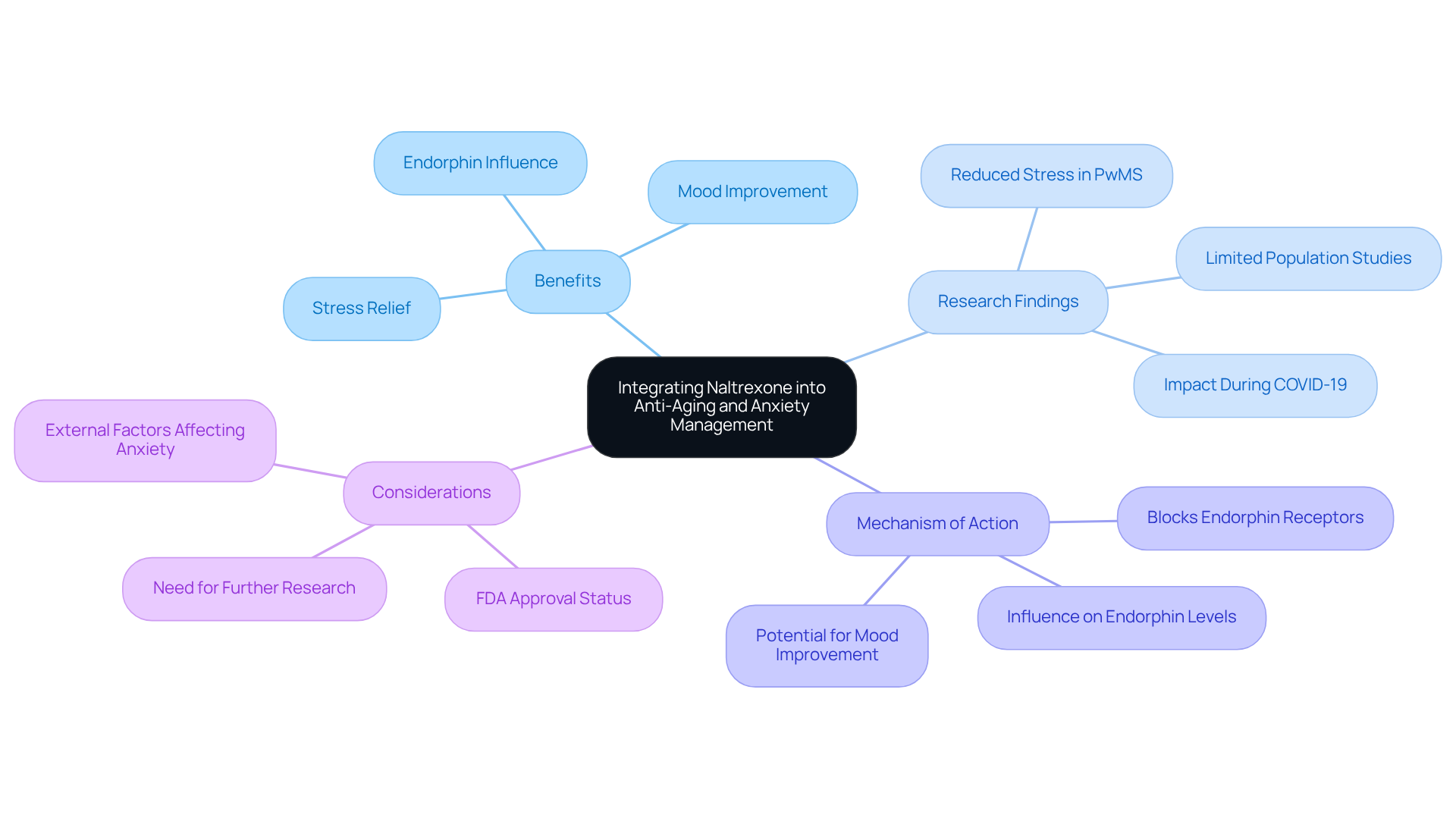
Naltrexone: A Tool for Anxiety Relief in Addiction Recovery
Naltrexone is primarily recognized for its role in treating alcohol and opioid dependence. By inhibiting the euphoric effects of these substances, it aids individuals in maintaining sobriety. This mechanism can also extend to alleviating stress, leading to the inquiry of whether naltrexone helps with anxiety, as many people in recovery experience heightened tension. By stabilizing mood and reducing cravings, this medication raises the question of whether naltrexone helps with anxiety, indirectly alleviating symptoms of distress and making it a valuable asset in addiction recovery.
Real-life examples illustrate how naltrexone helps with anxiety and its impact on stress levels among those in recovery. For instance, individuals who have utilized the medication often ask whether naltrexone helps with anxiety, as they report a significant reduction in nervousness, enabling them to navigate the challenges of sobriety more effectively. Research indicates that those undergoing treatment often experience improved emotional control, which contributes to lower stress levels throughout their recovery journey, leading to the question of whether naltrexone helps with anxiety.
Expert opinions further support the use of this medication in addressing whether naltrexone helps with anxiety for stress relief during rehabilitation. Many addiction specialists advocate for its integration into treatment strategies, while also exploring whether naltrexone helps with anxiety, highlighting its dual benefits of promoting sobriety and addressing stress. This dual action not only enhances the recovery experience but also fosters a more stable emotional state, which leads to questions about how naltrexone helps with anxiety and is crucial for long-term success.
In summary, this medication serves as a powerful resource in combating both addiction and stress, raising the question of whether naltrexone helps with anxiety, as it provides individuals with the support they need to achieve lasting recovery and improved mental well-being.
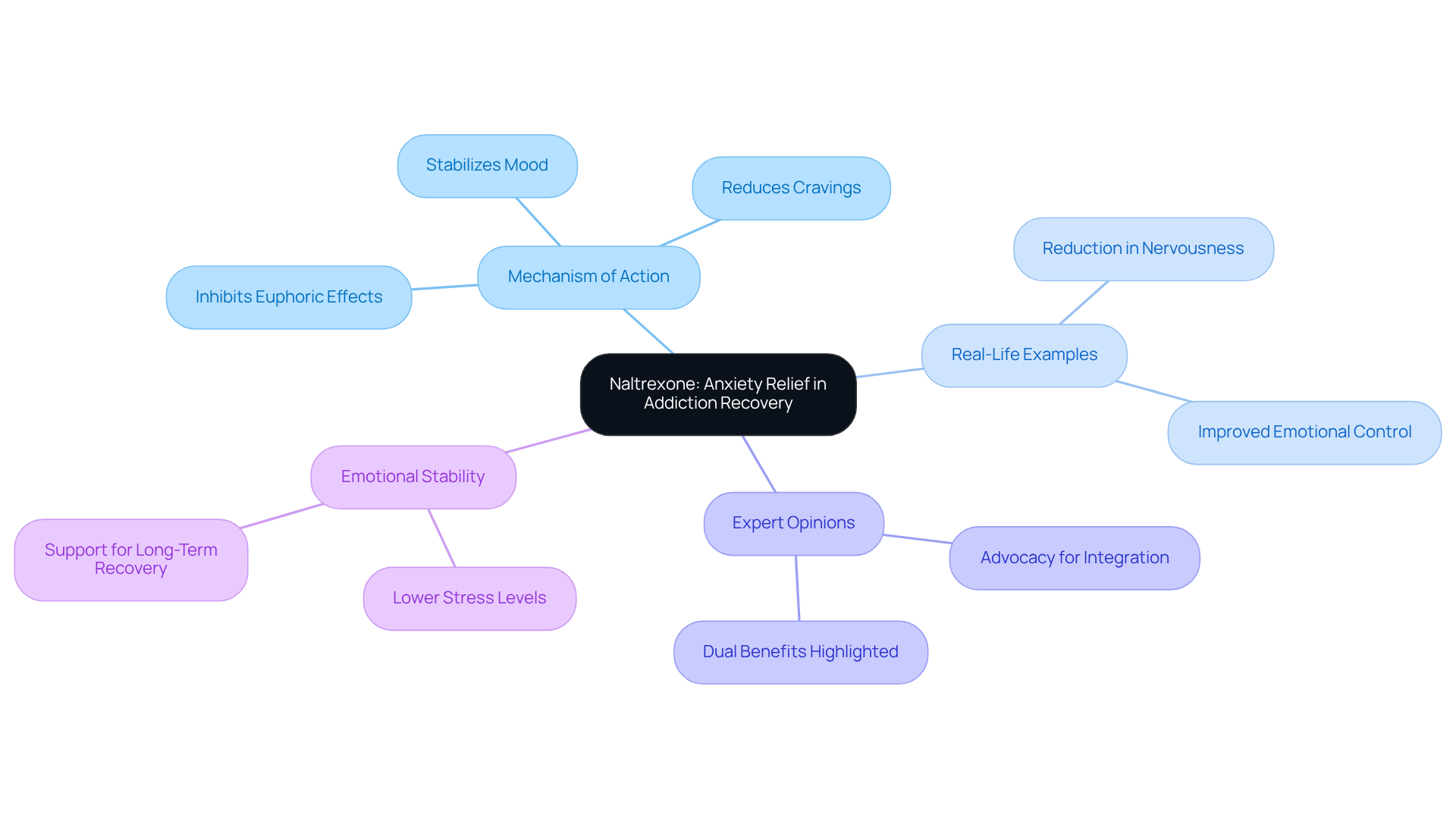
Naltrexone’s Impact on Brain Chemistry and Anxiety Reduction
Naltrexone operates by blocking opioid receptors in the brain, which triggers a compensatory increase in endorphin production. This rebound effect not only improves mood but also plays a significant role in reducing stress. Studies have indicated that this medication can assist in restoring brain chemistry, especially for those experiencing stress-related disorders. By stabilizing neurotransmitter levels, naltrexone enhances emotional regulation, which raises the question of how does naltrexone help with anxiety for individuals seeking relief.
Research shows that this stabilization can result in a more balanced emotional state, prompting the inquiry of whether does naltrexone help with anxiety-related conditions. Notably, naltrexone has received FDA approval for treating opioid and alcohol dependence, underscoring its therapeutic potential. Furthermore, expert insights propose that low-dose naltrexone (LDN) may further improve these advantages, especially in addressing worry and other associated conditions.
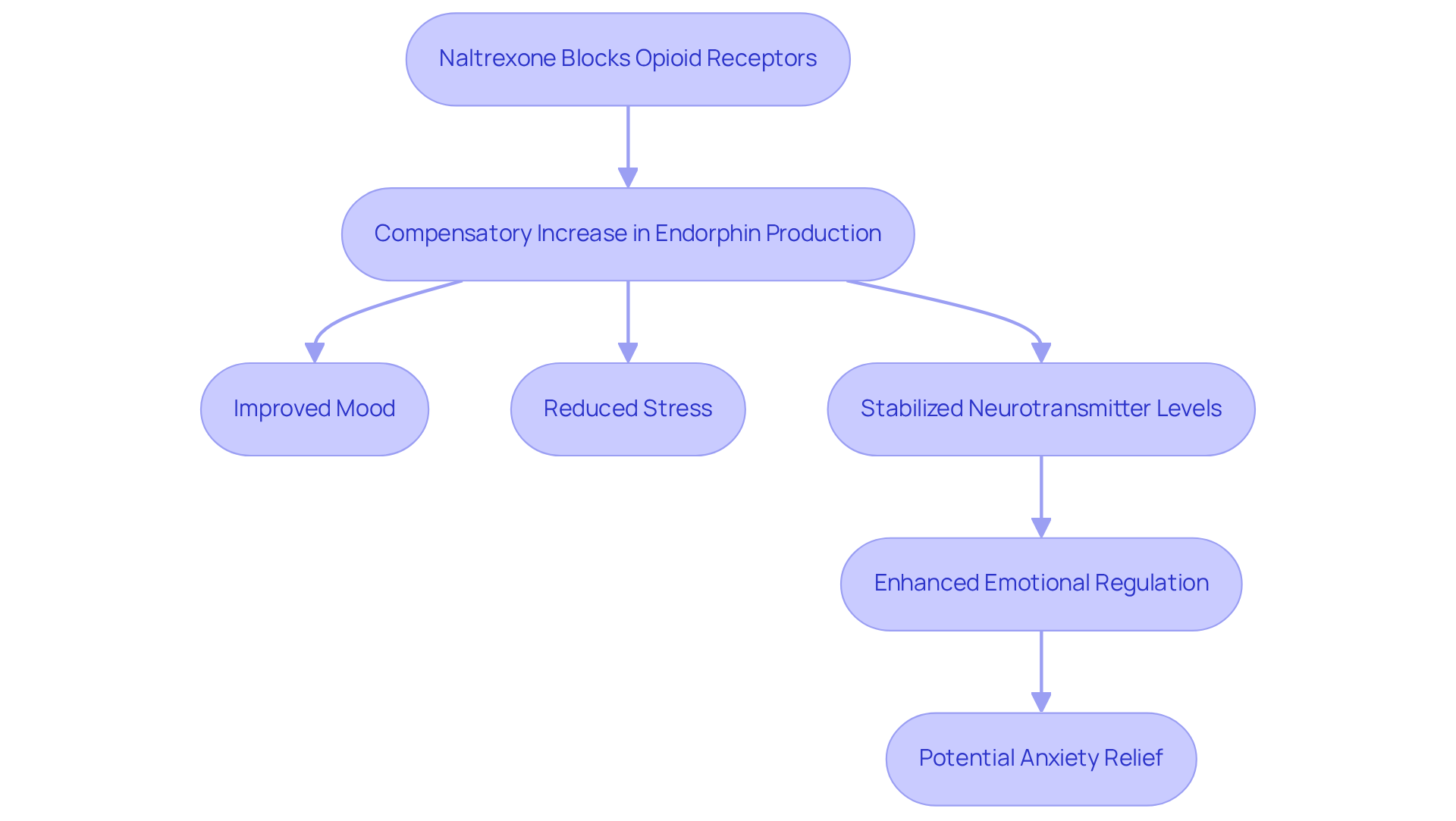
Side Effects of Naltrexone: Navigating Anxiety Concerns
While naltrexone can be an effective choice for stress relief, it is important to understand how does naltrexone help with anxiety and be aware of the range of side effects associated with its use. The most frequently reported side effects include:
- Nausea
- Fatigue
- Increased anxiety
Approximately 33% of users experience nausea, while fatigue is also a common complaint. Furthermore, 11% of people report pharyngitis as a side effect. It is essential for individuals to engage in open conversations with their healthcare providers regarding these potential side effects, enabling a thorough assessment of the benefits compared to the risks linked with treatment. Serious side effects, such as liver problems and increased thoughts of suicide, should also be considered when weighing treatment options. Modifying the dosage may assist in alleviating these issues, ensuring that the therapeutic benefits of the medication are preserved while reducing discomfort.
Real-life experiences underscore the importance of proactive management strategies. For instance, individuals have discovered that taking the medication with food can help lessen nausea, while regular physical activity may combat fatigue. Mindfulness practices and relaxation techniques can be beneficial in managing anxiety, especially when considering if does naltrexone help with anxiety during treatment. As Kimberly Rath, PharmD, notes, “These side effects may be temporary, lasting a few days to weeks.” By sharing these insights, patients can better navigate their journey with this medication, enhancing their overall treatment experience. Additionally, it is crucial to be aware that initiating the medication while opioids are still in the body can lead to withdrawal symptoms, making it vital to consult with a healthcare provider before beginning treatment.
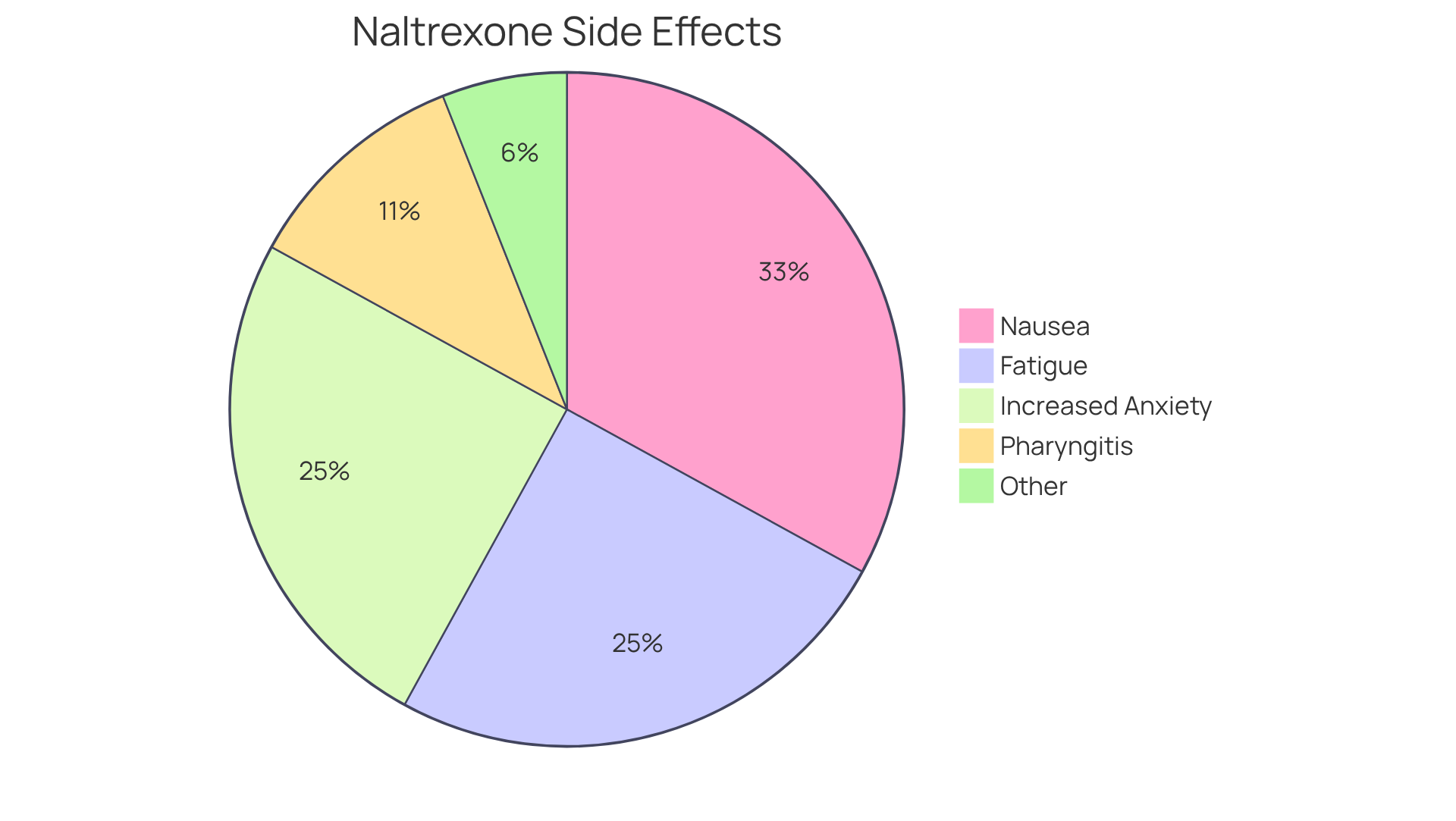
Enhancing Naltrexone Efficacy: The Role of Psychosocial Support
Integrating medication with psychosocial support—such as therapy or support groups—can significantly enhance its effectiveness in managing stress. Psychosocial interventions provide individuals with coping strategies and emotional support, thereby amplifying the biochemical effects of the medication. This integrated approach not only improves outcomes in stress management but also plays a vital role in addiction recovery.
Furthermore, consider how these strategies can empower individuals. By combining medical treatment with psychological support, patients may find themselves better equipped to handle stressors. This synergy can lead to a more comprehensive recovery process, making it essential for those seeking effective management techniques.
In addition, exploring various psychosocial options can be beneficial. Engaging in support groups or therapy can foster a sense of community and understanding, which is crucial for emotional well-being. As a result, individuals may experience a greater overall quality of life, paving the way for lasting change.
Ultimately, the integration of medication with psychosocial support is a powerful strategy. It not only addresses the symptoms of stress and addiction but also nurtures the emotional health of individuals, encouraging them to seek further resources and support on their journey to recovery.
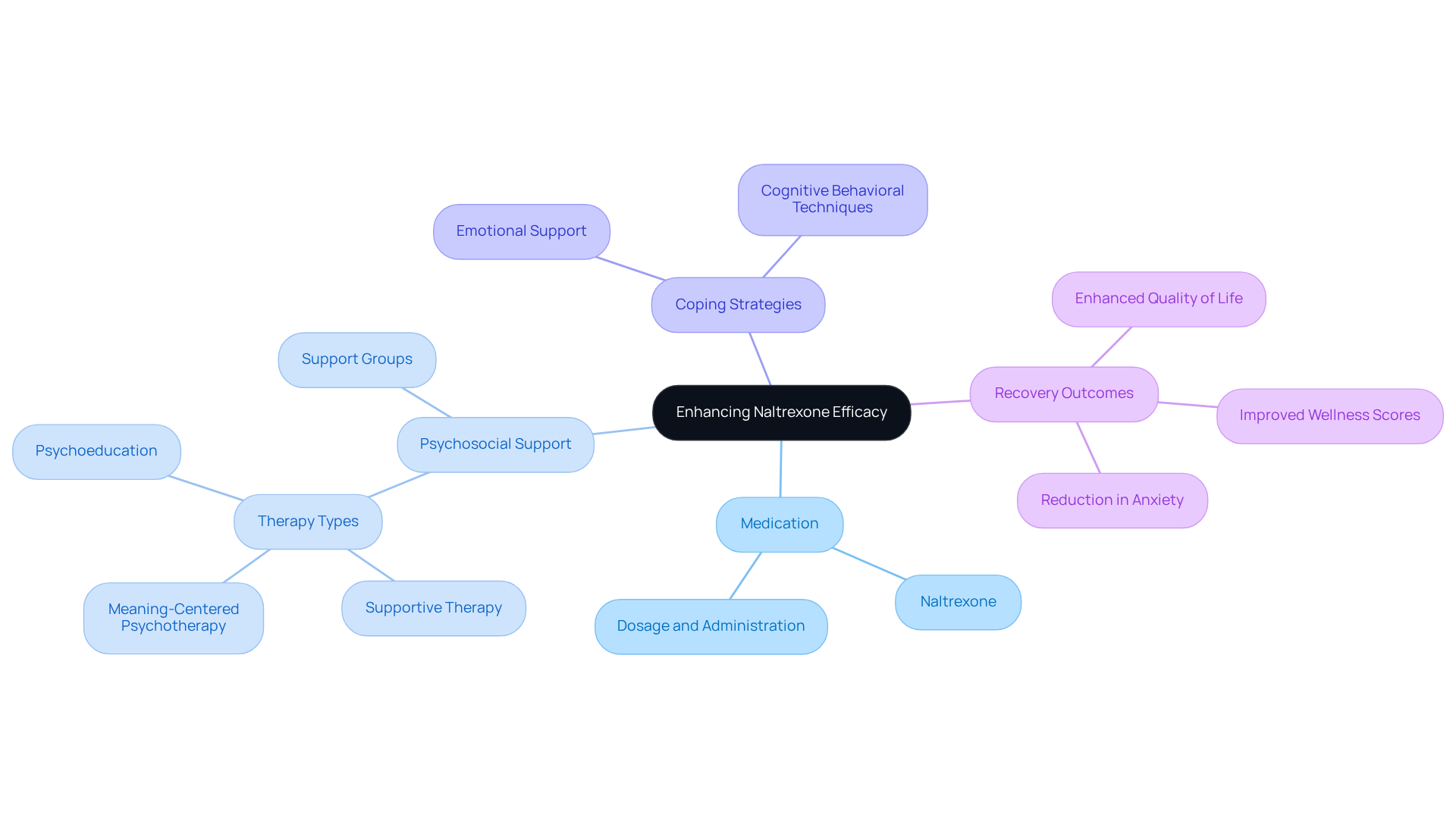
Low-Dose Naltrexone: A Potential Solution for Anxiety Management
Low-dose naltrexone (LDN) has emerged as a promising option for managing stress, leading many to ask, does naltrexone help with anxiety, particularly for individuals seeking alternatives to conventional medications. Research shows that LDN can effectively alleviate symptoms of unease, raising the question of whether naltrexone does help with anxiety by modulating the immune system and boosting endorphin production. This dual mechanism addresses both the psychological aspects of distress and the underlying inflammatory processes that may worsen symptoms.
In clinical studies, patients with multiple sclerosis (PwMS) reported significantly lower levels of apprehension and depression when prescribed LDN, leading to the inquiry of does naltrexone help with anxiety, whether used alone or alongside standard disease-modifying therapies. This suggests that LDN may serve as a valuable, non-toxic treatment choice for addressing stress, especially during challenging periods like the COVID-19 pandemic. Notably, a study found that 95% of patients responded positively to a 4.5 mg/day dose of LDN for fibromyalgia, further underscoring its effectiveness.
Moreover, LDN is generally well-tolerated, with minimal side effects, making it an attractive option for individuals who may experience adverse reactions to traditional stress-relief medications. Initial side effects can include fatigue, headaches, or vivid dreams, but these are often temporary. For instance, a study on post-COVID fatigue syndrome revealed that 62.7% of participants receiving LDN reported significant improvements in fatigue and overall functioning, which frequently correlates with reduced stress levels.
Real-life examples further illustrate LDN’s potential; a 51-year-old female patient treated for skin-picking behavior related to stress experienced substantial improvements while on LDN. These findings highlight LDN’s potential as a safe and effective alternative for those experiencing symptoms of distress, prompting the inquiry of does naltrexone help with anxiety and paving the way for further exploration and personalized treatment options.
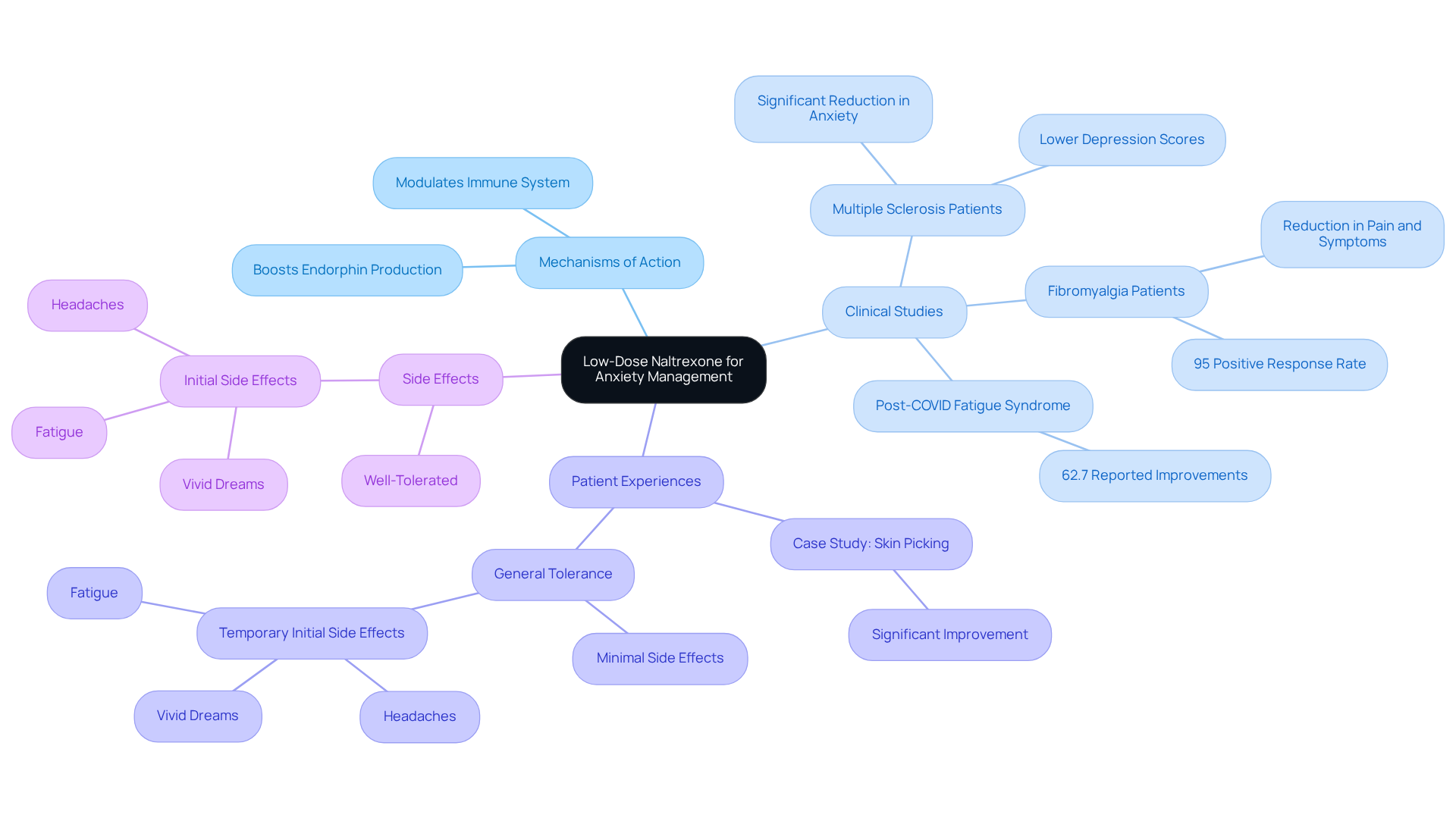
User Testimonials: Real-Life Experiences with Naltrexone and Anxiety
Many individuals have shared their positive experiences with the medication, particularly in its ability to reduce stress. Testimonials frequently highlight significant improvements in mood, lower stress levels, and an overall boost in well-being. For example, one user reported a renewed sense of control over their emotions after starting treatment, leading to fewer instances of unease. Another individual noted a substantial decrease in stress, allowing them to engage more fully in daily activities. These firsthand accounts not only underscore the potential benefits of this medication but also serve as encouragement for those contemplating whether does naltrexone help with anxiety in their anxiety management strategy.
Moreover, this medication boasts an average rating of 7.9 out of 10 based on 603 reviews, with 73% of reviewers indicating a positive experience. One user enthusiastically remarked, “LDN has changed my life in almost every way!” Such transformative effects illustrate the medication’s impact on enhancing mental health and emotional stability. However, it is crucial to consult a healthcare provider prior to starting this medication, as there are potential risks associated with its use.
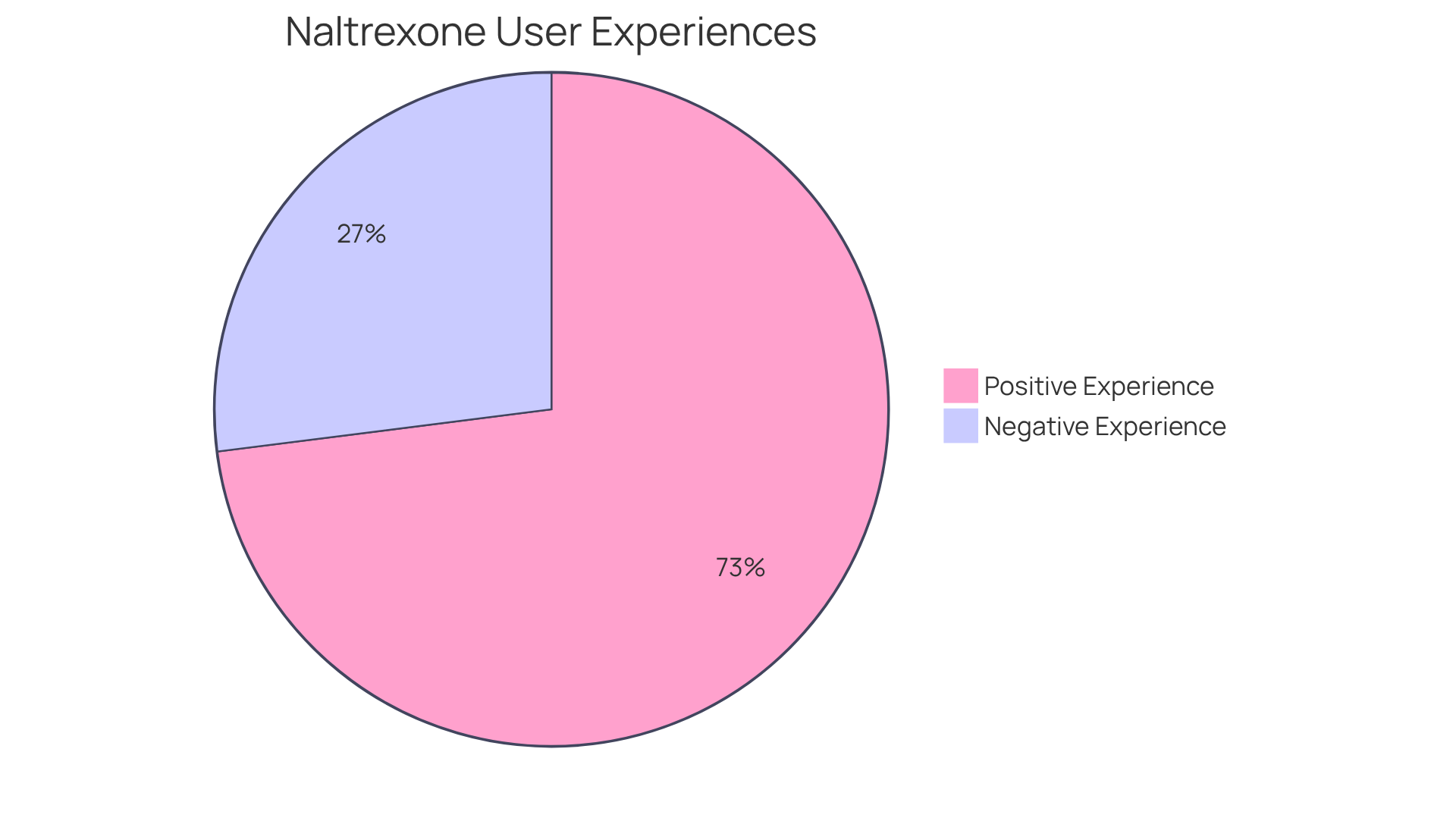
Naltrexone and Anxiety Disorders: A Research Perspective
Investigations are advancing to determine if does naltrexone help with anxiety and its role in relieving stress disorders. New studies suggest that low-dose therapy (LDT), administered at doses of 2.5-4 mg/day, may efficiently diminish stress symptoms and raise the question of whether does naltrexone help with anxiety, particularly in individuals with concurrent issues such as PTSD and depression. For instance, clinical observations indicate that LDN can assist in managing stress in patients with multiple sclerosis, where stress frequently exacerbates existing health challenges.
However, it is important to note that the FDA has not authorized this medication for treating nervousness due to inadequate proof backing whether does naltrexone help with anxiety for this specific condition. While current findings hint at its potential benefits, especially when integrated with other therapeutic modalities, comprehensive clinical trials, including those approved under protocol #9784, are essential to validate these claims and establish standardized treatment protocols.
As the research landscape evolves, this medication may emerge as a promising supplementary therapy for those struggling with unease, particularly alongside established treatments for PTSD and depression, which leads to the inquiry of whether does naltrexone help with anxiety. Notably, researchers Gary A. Thomas and Ian S. Zagon have contributed to this ongoing investigation, which is particularly relevant given the context of the COVID-19 pandemic.
It is also crucial to recognize that worry can be a frequent side effect of the medication, highlighting the need for a balanced view of its implications. Statistical examination of the data has indicated significance, with p-values < 0.05, further supporting the exploration of LDN in managing stress.
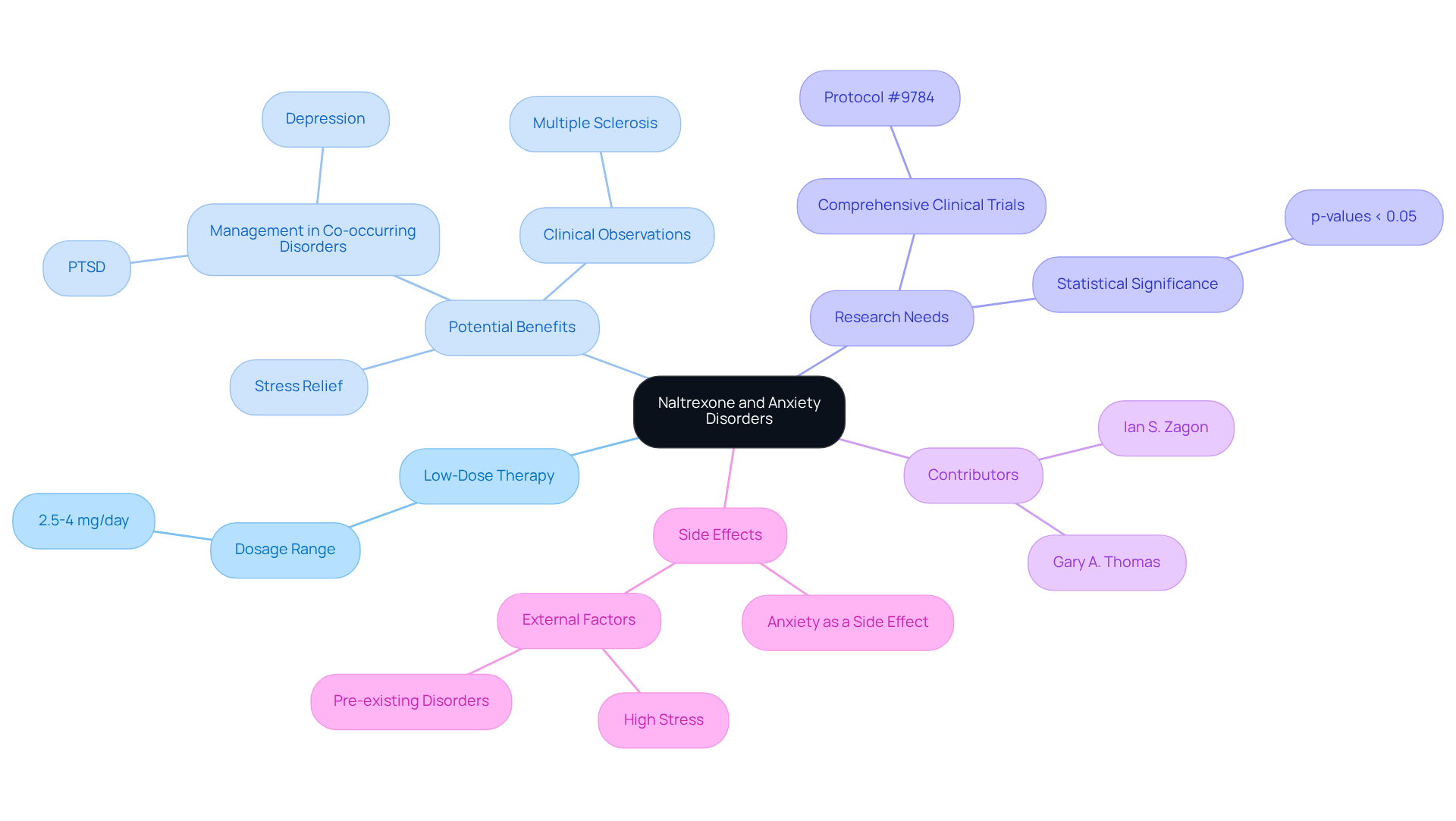
Complementary Therapies: Enhancing Anxiety Management with Naltrexone
In addition to various medications, different supportive treatments can significantly enhance stress management. Methods such as mindfulness, cognitive-behavioral therapy (CBT), and physical exercise have been shown to alleviate symptoms of worry. By incorporating these therapies alongside naltrexone, individuals can develop a more comprehensive treatment plan that addresses both the psychological and physiological aspects of stress, which leads to the inquiry of whether does naltrexone help with anxiety. This multifaceted approach not only improves overall well-being but also empowers individuals to take control of their mental health.
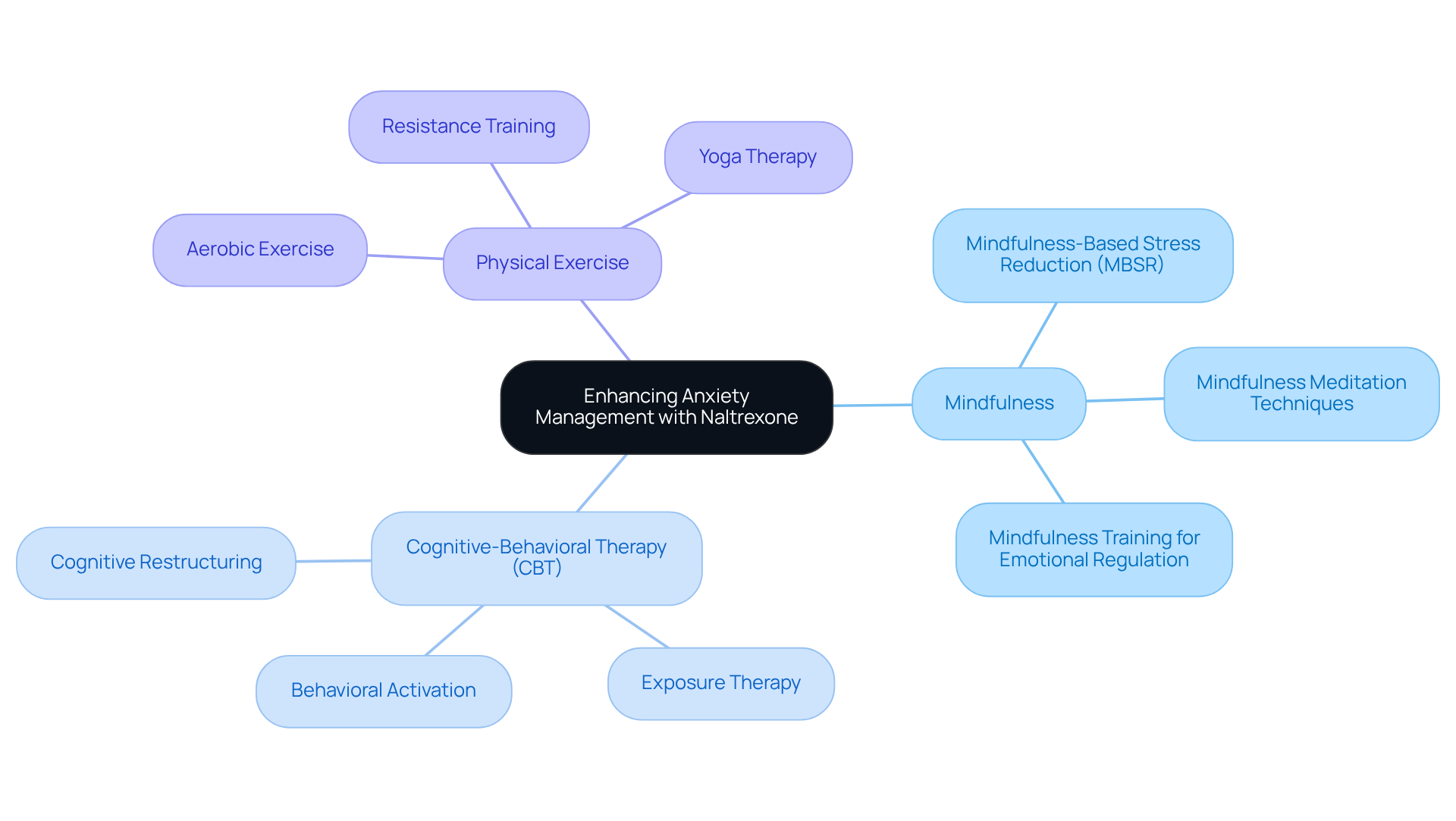
Mechanisms of Action: How Naltrexone Affects Anxiety
Naltrexone primarily functions by blocking opioid receptors in the brain, a mechanism that can lead to an increase in endorphin production. This uptick in endorphins is associated with an enhanced mood and a reduction in stress levels. However, it is crucial to recognize that blocking endorphins may also result in feelings of depression or unease in some individuals. Furthermore, the drug’s influence extends to the brain’s reward pathways, which are vital for emotional regulation. By stabilizing these pathways, this medication can help alleviate symptoms of unease.
Research indicates that this modulation of endorphin levels and reward circuitry is essential for understanding how does naltrexone help with anxiety management strategies. Additionally, it is classified as category C for use during pregnancy, highlighting potential risks to the fetus that should be carefully considered. Statistics reveal that the number needed to treat (NNT) for preventing heavy drinking with oral naltrexone is 12, underscoring its effectiveness in certain populations.
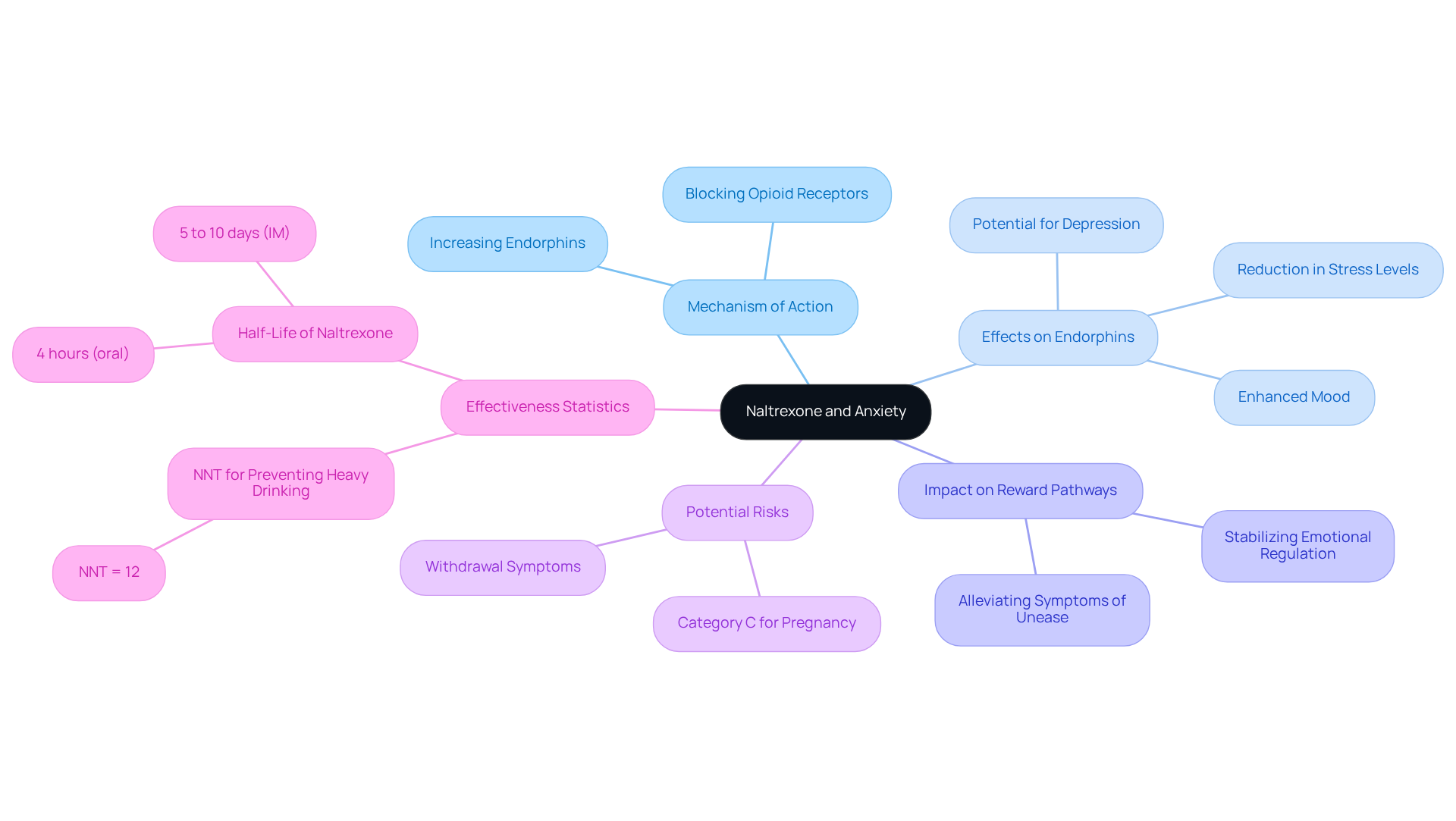
Conclusion
Integrating naltrexone into anxiety management strategies offers a multifaceted approach to alleviating stress and enhancing emotional well-being. This medication not only plays a crucial role in addiction recovery but also shows promise in addressing anxiety symptoms for various individuals. While ongoing research continues to explore its full potential, evidence suggests that naltrexone may serve as a valuable tool for those seeking relief from anxiety.
Key insights reveal that naltrexone’s mechanism of action—blocking opioid receptors and increasing endorphin production—significantly contributes to mood stabilization and stress reduction. Real-life testimonials demonstrate the positive impact of this medication, with many users reporting notable improvements in their emotional states and overall quality of life. However, it is essential to remain mindful of potential side effects and the importance of integrating psychosocial support to enhance treatment efficacy.
Ultimately, exploring naltrexone’s role in anxiety management underscores the necessity of a comprehensive approach to mental health. By combining medication with therapeutic practices, individuals can foster resilience and navigate the complexities of anxiety more effectively. As research continues to evolve, it is vital for those struggling with anxiety to consult healthcare professionals and consider personalized treatment plans that may include naltrexone as part of a broader strategy for achieving lasting relief and improved mental wellness.
Frequently Asked Questions
What is the role of naltrexone in anti-aging and anxiety management?
Naltrexone is being explored as a potential component in anti-aging strategies and anxiety management, particularly in low doses. While it may influence endorphin levels and alleviate symptoms of unease, its effectiveness for stress management is not FDA-approved due to insufficient evidence.
Are there any studies that support the use of naltrexone for stress relief?
Some studies suggest that individuals with multiple sclerosis who received low-dose naltrexone (LDN) reported reduced stress and depression during the COVID-19 pandemic compared to those on standard therapies. However, this research involved a limited population, and other factors may also affect stress levels.
How does naltrexone affect endorphin levels?
Naltrexone blocks endorphin receptors, which can inhibit the euphoric effects of substances. This mechanism may lead to feelings of unease or depression, but it can also increase endorphin levels, potentially improving mood and reducing stress in certain contexts.
What is naltrexone’s primary use in addiction recovery?
Naltrexone is primarily used to treat alcohol and opioid dependence by inhibiting the euphoric effects of these substances, which helps individuals maintain sobriety and may also alleviate stress and anxiety during recovery.
Do individuals in recovery report benefits from using naltrexone for anxiety?
Yes, individuals in recovery often report significant reductions in nervousness and improved emotional control when using naltrexone, which helps them manage the challenges of sobriety more effectively.
What do experts say about using naltrexone for anxiety relief?
Many addiction specialists support the integration of naltrexone into treatment strategies for stress relief during rehabilitation, noting its dual benefits of promoting sobriety and addressing anxiety.
How does naltrexone impact brain chemistry related to anxiety?
Naltrexone blocks opioid receptors, leading to a compensatory increase in endorphin production, which can improve mood and reduce stress. This stabilization of neurotransmitter levels enhances emotional regulation and may help those experiencing stress-related disorders.
Is low-dose naltrexone (LDN) considered effective for anxiety?
While naltrexone is FDA-approved for treating opioid and alcohol dependence, low-dose naltrexone (LDN) is being researched for its potential benefits in addressing worry and anxiety-related conditions, but further studies are needed to confirm its effectiveness.






